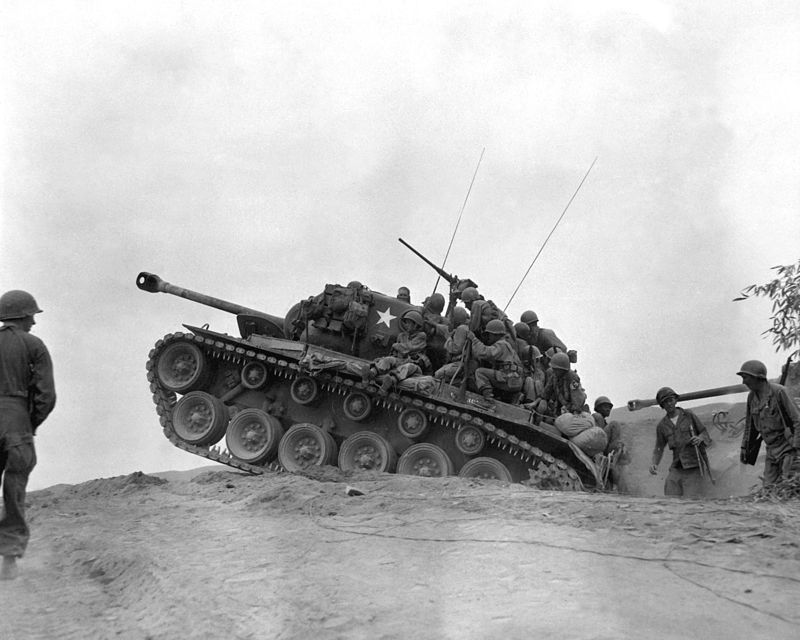August 31 in U.S. military history
1864: Two armies under the command of Maj. Gen. William T. Sherman engage Confederate Gen. John Bell Hood’s vastly outnumbered Army of Tennessee just south of Atlanta. Despite brilliant fighting and generalship in the Battle of Jonesborough, the Confederates destroy a trainload of military supplies to prevent its capture by the Union and withdraw to Atlanta.
1916: Near Guillemont, France, a German artillery shell scores a direct hit on 2nd Lt. Henry A. “Harry” Butters, instantly killing the popular Royal Field Artillery officer. Butters, an American citizen that joined the British Army at the outbreak of World War I, was so renowned that Winston Churchill (then a battalion commander with the Royal Scots Fusiliers) met with him and would write of Butters after his death. Butters’ gravestone simply read “An American Citizen” – as he requested – and every soldier that could be spared attended his funeral.
1940: As war rages across Europe and Asia, President Franklin Roosevelt federalizes 60,000 National Guard soldiers.
1942: After a squadron of eight Japanese destroyers finally manages to squeeze through Guadalcanal’s defensive ring and disembarks 1,000 Japanese troops the night before, the arriving force stages an attack on Henderson Field. Meanwhile, the Marine Corps’ elite 1st Marine Raider Battalion and 1st Parachute Battalion arrive from Tulagi.
While four Marine Corps parachute operations are planned during the war, the highly trained Paramarines are never used for their intended purpose and will only be used in conventional roles. The Paramarines and Raiders – considered to be among America’s first special operations units – will both be disbanded by war’s end.
1943: The Navy commissions the destroyer escort USS Harmon – the first warship to be named after an African-American. While serving aboard the USS San Francisco (CA-36) during the Battle of the Solomon Islands, Mess Attendant First Class Leonard R. Harmon “deliberately exposed himself to hostile gunfire” to protect a medic providing care to wounded sailors, in addition to displaying unusual loyalty on behalf of the ship’s injured executive officer. For his actions, Harmon was posthumously awarded the Navy Cross.
1950: (Featured image) Near midnight, as enemy mortar rounds hammer the American lines along the Naktung River, a force of 500 communist soldiers crosses the river under cover of fog and launches a fierce attack. When the infantry begin to withdraw, their supporting armored vehicles take up defensive positions to cover the soldiers. Two American tanks are overrun, one is destroyed, and another retreats, leaving just one M-26 Pershing tank to hold off the enemy. Sgt. 1st Class Ernest R. Kouma, a veteran of the Battle of the Bulge and now a tank commander, and his crew are surrounded. For the next nine hours, they hold off repeated fanatical attacks. When the North Koreans get too close, Kouma hops out of the protection of his tank and mans the .50-caliber gun, showering the communists with deadly point-blank fire. Once the gun was empty, he switched to his pistol and used grenades to keep the enemy from overrunning his tank. As the exhausted tankers withdraw to friendly lines, they first have to cross eight miles of hostile territory and take out three machinegun positions along the way.
Although he was suffering from serious wounds, Kouma began rearming and resupplying his tank, hoping to get back into the fight. He accounted for an incredible 250 dead enemy soldiers and the actions of Kouma and his crew enabled the infantry to reach defensive positions. Sgt. 1st Class Kouma is sent home and awarded the Medal of Honor.
1955: The Boeing KC-135 Stratotanker makes its maiden flight. Built to serve Strategic Air Command’s B-52 fleet, the tanker enters service in 1957. Stratotankers are still fueling our aircraft one of six aircraft to serve the U.S. military for over 60 years. The others are the B-52 Stratofortress, C-130 Hercules, U-2 Dragon Lady, T-38 Talon, and P-3 Orion.

Today’s piece is in honor of Army Staff Sgt. Joshua Bowden, who died of injuries from a small-arms battle in Ghazni, Afghanistan. The 28-year-old native of Villa Rica, Ga. was on his second Afghan deployment and assigned to the 242d Ordnance Battalion (EOD), 71st Ordnance Group.
